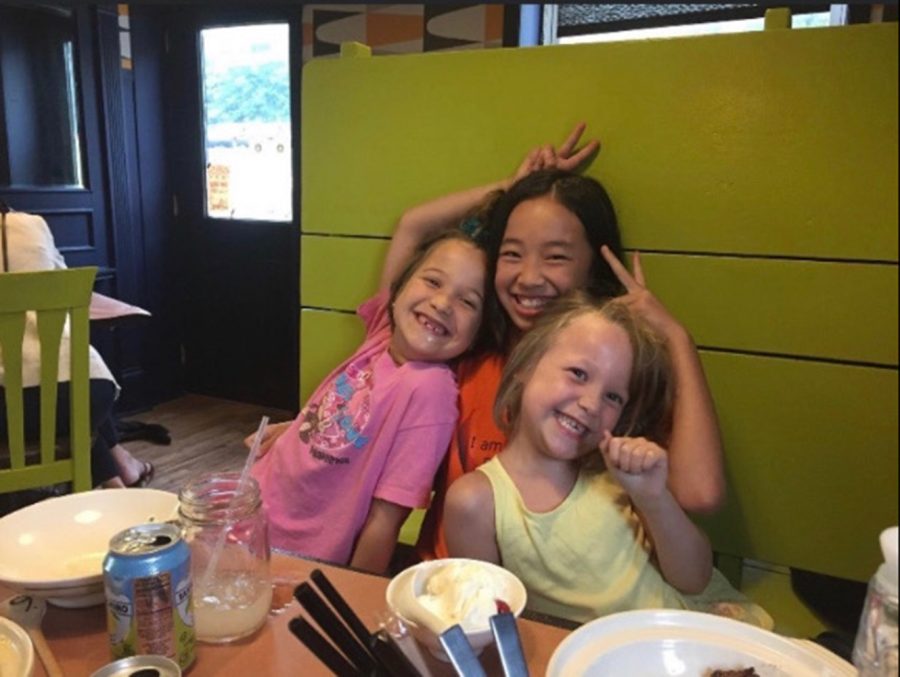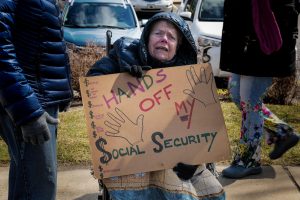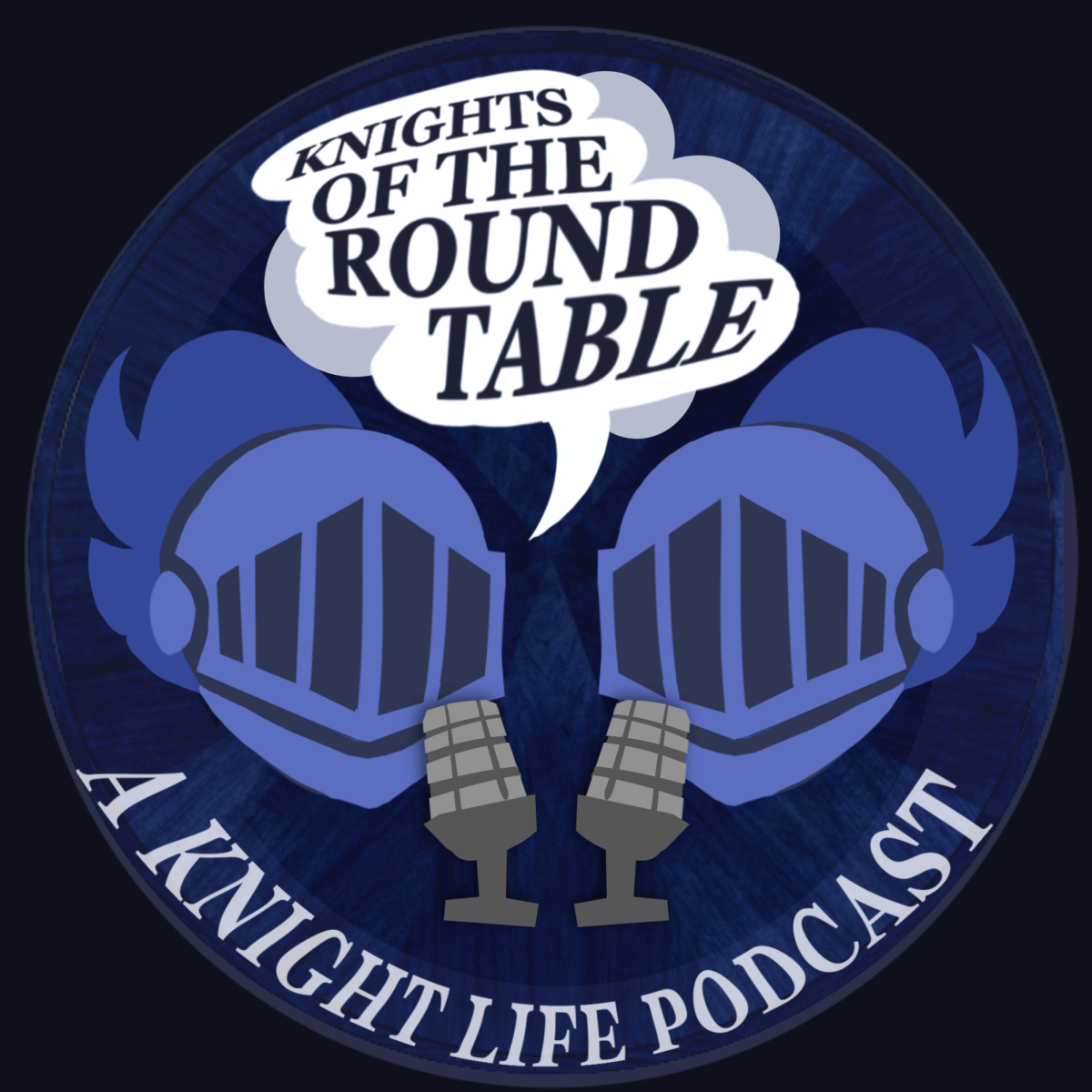Students recall conflicts with siblings and disadvantages of being the oldest, middle and youngest sibling
Credit: Rosario Curcuru
Young Alice Wadsworth-Curcuru (left), Wen Wadsworth-Curcuru (middle), and Téa Wadsworth-Curcuru (right) celebrating a birthday at a restaurant. The siblings are now ages 14, 18, and 12.
December 12, 2022
It’s a normal Tuesday morning and freshman Robin Jennings is patiently waiting at the kitchen table for their older brother to drive the two of them to school. Five minutes later, when their brother still isn’t ready, Robin storms upstairs to find that their brother, and their only form of transportation to school, is still asleep. When they finally arrive at school, Robin is barely able to slip through the door of their first hour class before the final bell rings.
Robin Jennings, along with many other students, rely on their siblings for important tasks. In Robin’s case, they rely on their brother to give them a ride to school.
“He doesn’t like getting out of bed in the morning to drive me to school,” said Jennings. “He needs to figure out how to manage his time.”
Around 80% of people in the United States have siblings. According to Jessica Grose’s story “Sibling Fights Might Be Bad for Kids. What’s a Parent to Do?”, 50% percent of people between the ages 3-17 face conflict with their siblings on a daily basis.
Sibling troubles are common and normal, but that doesn’t mean it’s the same for everyone. Some siblings face problems as children and teenagers, but the older and more mature they become, the less common those conflicts occur. For others, siblings can continue to face conflict throughout adulthood.
Freshman Isaac Patrick believes that the problems he faces with his sister will deteriorate over time.
“I think our relationship will grow stronger the more mature we become,” said Patrick.
Freshman Rosie Hill has a sibling who’s away at college. She credits the distance when it comes to her changing relationship with her sister.
“I think there will be less problems now because we’re around each other less,” said Hill,
“but that could become a problem because we could grow apart.”
Different people have different ways of working out problems with their siblings. Some ignore the problem until it goes away on their own, some talk through it until the problem is solved, and some, including junior Tomokai Timmer, crack jokes until the problem has dissipated.
“I make a joke and I’m really funny, so she laughs and then it’s better because I’m the best,” Timmer said.
A large debate topic is whether being the oldest, middle, or youngest child is harder. All three placements have their pros and cons, but it heavily depends on the other sibling(s) and the parents/guardians in the family. People with siblings may feel that they are treated unfairly because of the actions of their parents or other siblings.
Parents tend to have a clearer idea on what they’re doing when it comes to the younger sibling. The oldest child is the parents’ first born, and it’s most likely their very first time parenting. Sometimes parents may be unprepared to have a child, and might not know what they’re doing at first.
When it comes to the younger siblings, the parents have more experience with parenting by then, and they might have an easier time with the later born children. In some cases, this means the younger child can get away with more than what the older siblings might be able to.
However, being the youngest sibling can seem unfair and frustrating at times. Being babied by others, others believing you’re spoiled, and feeling like you have to meet the expectations that your siblings set can be frustrating.
“It’s frustrating growing up and seeing your older sibling being able to do things you can’t do yet,” Jennings said.
Rosie Hill, freshman, is also the youngest sibling in her family.
“When you’re younger, it’s probably harder because she was never really nice to me when we were little because of the age difference, and I couldn’t really relate to her,” said Hill, “but the older and more mature we got, the easier it got because that age gap felt smaller.”
Middle siblings often feel left out or overlooked. Freshman Alice Wadsworth-Curcuru is the middle child in their family and they face these problems. They believe that it’s harder to be the middle child.
“I think it’s a lot harder especially when you get forgotten,” said Wadsworth-Curcuru, “I don’t get the importance of being the oldest, and I don’t get the easiness that goes along with being the youngest.”
Older siblings often have to be leaders or role models for their younger siblings. They may feel more pressure to be perfect and set examples for their younger siblings.
“You have to take care of them and be a role model,” said Timmer, who is the oldest.
Older siblings are also often the people their siblings run to when they need help if they can’t get help from their parents. They may feel that they need to have all the right answers to their siblings’ questions.
Freshman Isaac Patrick is the oldest sibling in his family, and he often finds himself struggling to answer the questions his younger sister asks.
“I think it’s harder being the older sibling because they’re the ones asking you for advice, not giving advice,” said Patrick.
The majority of siblings, no matter the birth order, face some conflict with each other. There are some moments where you may hate your sibling, but in the end, family is family.












